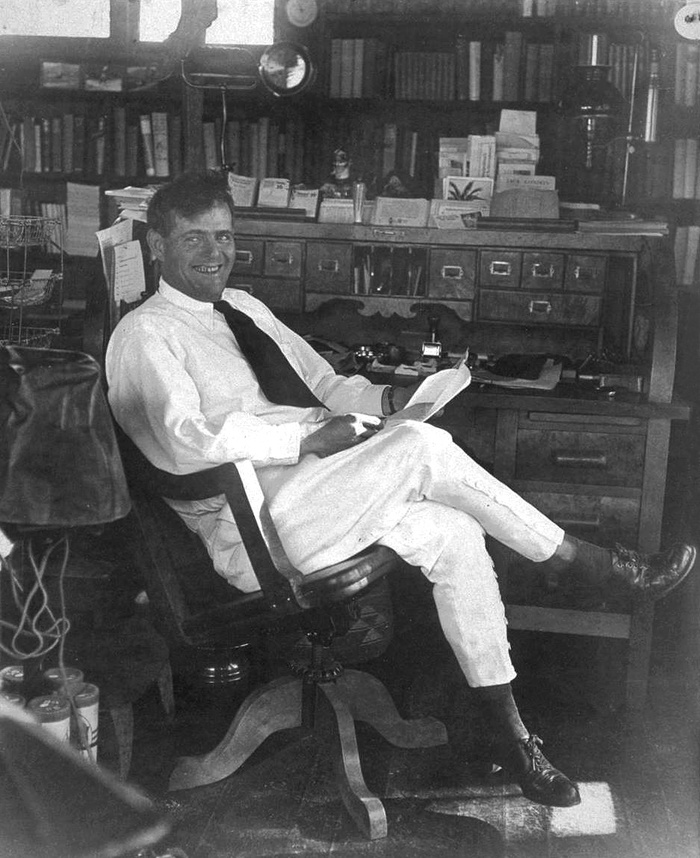
Born: Not Found
Died: Not Found
Region: Not Found
Address: Not Found
Biography:
Jack London was born John Griffith Chaney on January 12, 1876, in San Francisco, California. After working in the Klondike, London returned home and began publishing stories. His novels, including The Call of the Wild, White Fang and Martin Eden, placed London among the most popular American authors of his time. London, who was also a journalist and an outspoken socialist, died in 1916. His father was never part of his life, and his mother ended up marrying John London, a Civil War veteran, who moved his new family around the Bay Area before settling in Oakland. Jack London grew up working-class. He carved out his own hardscrabble life as a teen. He rode trains, pirated oysters, shoveled coal, worked on a sealing ship on the Pacific and found employment in a cannery. In his free time he hunkered down at libraries, soaking up novels and travel books. His life as a writer essentially began in 1893. That year he had weathered a harrowing sealing voyage, one in which a typhoon had nearly taken out London and his crew. The 17-year-old adventurer had made it home and regaled his mother with his tales of what had happened to him. When she saw an announcement in one of the local papers for a writing contest, she pushed her son to write down and submit his story. Jack London was a 19th century American author and journalist, best known for the adventure novels White Fang and The Call of the Wild.
Jack London was born as John Griffith Chaney on January 12, 1876 in the slums of San Francisco. His mother was Flora Wellman Chaney. His biological father, William Chaney, was never part of London's life, and it is unknown whether or not he ever legally married Flora. In September of 1876, just eight months after London was born, Flora married John London, Pennsylvania native and Civil War veteran of the Union army, who adopted Jack as his own. Consequently, John Griffith Chaney was renamed John Griffith London. He started going by "Jack" later in his childhood.
London's mother was a spiritualist and his biological father was an astrologist. Flora Wellman came from a wealthy home in Massillon, Ohio. She believed she could communicate with the dead, a belief called Spiritualism that reached heights of popularity as she grew up in the 1840s. She also believed she could predict the future. When she was fifteen, the panic of 1858 destroyed her father's finances, and she left home. During the Civil War she was a volunteer with the Sanitary Commission, but nothing else is known about where and how she lived between the years 1860 and 1870. In the early 1870s she took up with William Chaney, a traveling astrologer, in Seattle, Washington. In 1874 the couple moved to San Francisco where Flora brought in money performing seances and teaching music, and William gave lectures on astrology.
While she was pregnant, London's mother tried to kill herself. When William Chaney found out that Flora was pregnant, he beat her and demanded that she have an abortion. After the altercation, Flora attempted suicide twice in the course of two days. First, she overdosed on laudanum. When that attempt failed, she tried to shoot herself in the head, but her second attempt was thwarted by a gun malfunction.
At the age of 18, London was arrested for vagrancy. In 1894, London joined a group called Kelly's Army, a throng of unemployed men dubbed tramps and hobos, who set out from California riding the rails. Kelly's Army was part of a larger group of protesters known as Coxey's Army, which originated in Massillon, Ohio. The goal of Coxey's Army was to march on Washington D.C. and protest unemployment. London split from the group in Missouri and traveled to Niagara Falls where he was arrested, charged with vagrancy, and kept in jail for a month. He would later recount the events of Kelly's Army and his arrest in his autobiographical narrative, My Life in the Underworld.
London was briefly a student at the University of California at Berkeley. In September of 1896 Jack London became a student at the University of California at Berkeley, but he was only a student there for one semester before running out of money. Shortly after leaving UC Berkeley, London followed the Gold Rush and sailed for the Klondike, an experience that inspired his two most famous novels, Call of the Wild and White Fang.
London wrote 1,000 words every day. While toiling in the gold fields of the Klondike, London became severally malnourished and lost several of his front teeth to scurvy. His failing health forced him to return home. When he returned to California in 1898, he was met with the news that his step-father, John London, had died. He decided to dedicate himself to professional writing in order to support his mother. From that moment on, he made it his discipline to write 1,000 words every day.
Jack London died at the age of 40. Jack London struggled with his health his entire adult life, due in large part to alcoholism. In 1913, London's doctor discovered that his kidney's were failing, and London began taking morphine to help control the pain. He died at his California ranch on November 22, 1916. His cause of death was a combination of uremia and morphine poisoning. It has been debated among biographers and scholars whether the morphine poisoning was intentional by London.
Product successfully Added!

